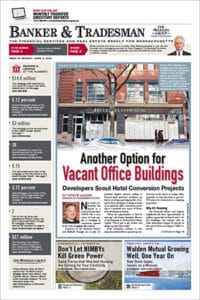The beginning of this month may have marked a turning point in the unending river of optimism about home price appreciation in Greater Boston.
First, CoreLogic released a report that said the median cost of a single-family home in Greater Boston rose 7 percent between September 2016 and September 2017 and called the market “at value.” About half of the top 50 markets in the country are overvalued, the report said.
Also that week, in a ranked list from the Urban Institute of the 25 largest MSAs in the country most likely to be experiencing a bubble, Boston ranked 20th, which is concerning.
This week Joseph Song, vice president and senior U.S. economist for Bank of America and Merrill Lynch Global Research, told an auditorium filled with Realtors at the Federal Reserve Bank in Boston that he was concerned by housing inflation.
At the same event, NAR Chief Economist and Senior Vice President of Research Lawrence Yun said high prices – not a lack of demand – is limiting the number of sales in Greater Boston.
Yun also pointed out that Greater Boston’s population is more educated than other parts of the country and that student debt is keeping a lot of potential buyers out of the housing market.
Finally, in its November Insight, Freddie Mac assured the country that despite rapid appreciation of home prices, the United States is not in a real estate bubble.
Freddie Mac’s reasoning is sound: people aren’t over-leveraged on predatory loans, so as a country, we’re clearly not in the same bubble we were a decade ago. But are we in a Boston bubble? Or maybe Greater Boston isn’t in a bubble, but heading for some other kind of trouble? Something we haven’t seen before?
Critically low inventory and historically low interest rates are driving prices through the roof in Greater Boston right now. It is widely believed that mortgage interest rates can’t stay this low forever. We’ve seen modest movement upward and everyone expects them to keep going up.
Eventually empty-nesters or their heirs will be forced to sell their homes. Nobody lives forever. But Baby Boomers are living longer – and staying in their homes longer – and there’s no evidence that trend is going away.
And although there has been talk of loosening up zoning and making it easier to build more residential housing in this state, there have been only small pockets of success in this regard. For a decade we’ve failed to build enough homes to keep up with demand and Massachusetts municipalities show no signs of addressing this issue in any meaningful way.
So the upward pressure on prices will continue for the foreseeable, but it can’t go on forever. No one surfing this gnarly wave wants to think about it crashing, but crash it will, as all waves do.
Will prices simply hit a ceiling and stay there? Will companies leave or stop coming here and instead move to cities that offer better weather, better commutes and more affordable real estate? Will Millennials ever get into the homebuying market en masse? How high can prices go?
I certainly don’t know, but it feels like the winds of change are blowing. One high-volume agent in the luxury market quantified how much higher prices could go last summer and said, “I think we’re in the seventh inning.”






